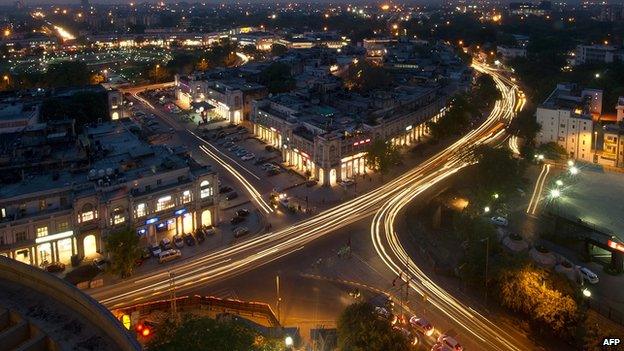Indian media: Delhi threatened by power cuts
- Published

The lights could go out in Delhi
Media are worried that Delhi may face extensive power cuts from Monday if a key distribution firm does not resolve a dispute with the country's top power producer, the National Thermal Power Corporation (NTPC).
NTPC has threatened to cut supplies if BSES Rajdhani Power Limited (BRPL), a distribution company for large parts of the Indian capital, does not clear its dues.
BSES has now asked the Supreme Court to rule on the matter.
The Times of India, external reports that if the court does not resolve the issue soon, then "south and south-west Delhi face the prospect of a 50% power cut after 10 February, the deadline given by NTPC".
Since January, distribution companies have been locked in conflict with the Delhi government, led by the Aam Aadmi Party (AAP).
The AAP came to power last month after winning elections with promises to clamp down on corruption. The party also said it would cut the cost of electricity, a pledge it has upheld for some consumers.
But this has led to conflict with distribution companies, who say "they will be forced to black out large parts of Delhi because low tariffs leave them with no money to buy electricity", the Economic Times, external explains.
"The consumer may be the biggest casualty" in the spat, the paper warns.
'Chaotic' parliament
Newspapers also fear that disruptions over the controversial Telangana bill could obstruct other important legislation as the parliament holds its last session before general elections later this year.
The federal government wants to divide the southern state of Andhra Pradesh and create a new state, Telangana.
But lawmakers in Andhra Pradesh last week rejected any such division, and MPs from the state are now disrupting proceedings in both houses of parliament in Delhi.
The Deccan Chronicle, external reports that the lower house functioned for only 15 minutes on Thursday, while the upper house worked for 10 minutes as "controversy over Telangana… washed out proceedings... for a second day".
"The spectacle that lies ahead will likely be as chaotic, unedifying and unproductive," predicts The Times of India in an editorial.
The paper adds that none of the other important bills, such as legislation aimed at fighting corruption or ensuring the rights of disabled people, "are now likely to see the light of day".
"Much of the responsibility for the ugly denouement lies with [the ruling party] Congress. It created an unholy mess in Andhra," concludes The Times of India, external.
The Asian Age, external, however, says that others are also to blame. It gives an example with the main opposition Bharatiya Janata Party (BJP), which is "committed to Telangana" but would be "happy to see the Congress bid fail before the polls".
"There is too much politics in the air," says the daily, adding that opposition parties also had no intention of letting Congress "walk away with the credit of piloting anti-graft measures".
No money for jets
Meanwhile, India has postponed a plan to buy 126 fighter planes from France's Dassault Aviation, the Hindustan Times, external reports.
The $15m deal for the Rafale fighters was expected to be finalised by the end of March.
"Major procurement can only be possible in the next financial year. There is no money left," Defence Minister AK Antony is quoted as saying.
India's military, the world's biggest arms importer for three years running, has already spent 92% of its defence capital budget for this year, the paper explains.
And finally, the village of Bibipur in the northern state of Haryana has started a community programme that encourages people to help each other.
Everyone taking part will be asked to assist three other people in areas such as medical care, documentation and employment, says a report in the Deccan Herald, external.
The local authorities hope to generate a "chain reaction" of help and promote goodwill in the village, the daily adds.
BBC Monitoring, external reports and analyses news from TV, radio, web and print media around the world. For more reports from BBC Monitoring, click here. You can follow BBC Monitoring on Twitter , externaland Facebook, external.